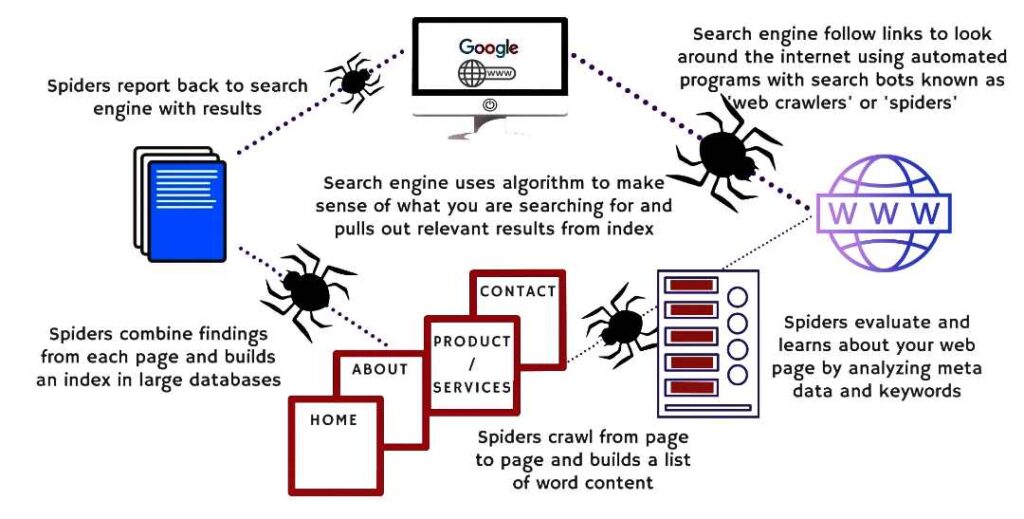How Does google search works ?
Written by
Updated :
1 year ago
How Does google search works ?
Google’s search engine is one of the most widely used and powerful tools on the internet. It allows users to quickly and easily find the information they are looking for by typing in a query and receiving a list of relevant results. But How does google search works ? In this blog post, we will delve into the inner workings of the Google search engine to better understand the technology behind one of the most important tools of the internet age.
At its core, the Google search engine is built on a massive index of web pages. This index is created by “crawling” the web, which involves automatically visiting and analyzing billions of web pages. As the Google crawler visits these pages, it extracts the text and other information from each page, and adds it to the index. This process allows the search engine to quickly and efficiently match a user’s query with relevant pages from the index.
The index is only the first step in the search process. Once the user types in a query, the search engine uses a complex algorithm to determine the relevance and importance of each page in the index. This algorithm, known as the PageRank algorithm, takes into account over 200 factors, or “signals,” in its ranking. Some of the most important signals include:
- Relevance: The search engine looks at how well the content on a page matches the user’s query. This includes things like the use of keywords in the text, the use of synonyms and related terms, and the overall structure and organization of the content.
- Authority: The search engine also looks at the authority and credibility of the site. This includes things like the number and quality of inbound links to the site, as well as the overall reputation and trustworthiness of the site.
- Freshness: The search engine also takes into account how recent the content on a page is. This is important because the relevance of a page can change over time.
- Location: The search engine also takes into account the location of the user and the location of the site. This is important for providing relevant results for local search queries.
Once the search engine has ranked the pages in the index, it presents the top results to the user. These results are usually presented as a list of web pages, with the most relevant and authoritative pages appearing at the top of the list. The user can then click on one of the results to visit the site, or refine their query and try again.
Explanation of how the Google search engine works :
- Machine Learning: Google uses machine learning algorithms to better understand user queries and provide more relevant results. It also uses machine learning to improve its crawling and indexing process.
- Personalization: Google takes into account the user’s search history, location, and other personal information to provide personalized search results.
- Mobile optimization: With the increase of mobile devices usage, Google has a mobile-first indexing approach that prioritizes the mobile version of a website and its content in search results.
- Featured snippets: Google’s featured snippets are designed to provide quick and concise answers to user’s queries, it appears at the top of the search results, it can be a paragraph or a list of items that directly answers the user’s question.
- Google’s Search Console: This is a tool that allows website owners to see how their site is performing in search results, identify any issues and make improvements.
- Google’s Algorithm updates: Google regularly makes changes to its algorithm, these updates can have a significant impact on a website’s search visibility.
- Voice search: Google’s voice search technology allows users to search for information using voice commands, it’s becoming increasingly popular and Google is working to improve its accuracy and functionality.
- Search beyond the web: Google’s search engine also allows users to search for information that’s not available on the web such as books, patents, flights, and weather information, and more.
In addition to the core search functionality, Google also offers a number of other features and services. These include:
- Image search: Allows users to search for images on the web.
- Video search: Allows users to search for videos on the web.
- News search: Allows users to search for news articles on the web.
- Maps and local search: Allows users to search for businesses and other points of interest in their local area.
- Shopping search: Allows users to search for products and compare prices from different retailers.
- Book search: Allows users to search for books and find information about them.
- Patent search: Allows users to search for patents and find information about them.
- Flight search: Allows users to search for flights and compare prices from different airlines.
- Weather search: Allows users to search for weather information for a specific location.
- Music search: Allows users to search for songs and albums and find information about them.
- Scholar search: Allows users to search for scholarly articles and find information about them.
- Translation: Allows users to translate text from one language to another.
- Currency converter: Allows users to convert between different currencies.
- Calculator: Allows users to perform calculations and mathematical equations.
Overall, the Google search engine is a complex and powerful tool that is constantly evolving. The company is constantly working to improve its algorithm and add new features and services to provide users with the best possible experience. By understanding the inner workings of the search engine, we can better appreciate the technology that powers one of the most important tools of the internet age and how it helps us find the information we need quickly and easily.
Frequently Asked Questions
What is Google Search?
- Google Search is a fully-automated search engine that uses web crawlers to explore the internet and find pages to add to its index.
- It helps users find relevant information by analyzing text, images, and videos on web pages.
How does Google discover web pages?
- Google discovers web pages through automated programs called crawlers.
- Crawlers follow links from known pages to new pages and continuously update the list of known pages.
What happens during the crawling stage?
- Googlebot (the crawler) fetches pages and analyzes their content.
- Googlebot avoids overloading sites by adjusting its crawling speed based on site responses.
What is indexing?
- Google analyzes text, images, and video files on a page and stores this information in its index (a large database).
- The index helps Google retrieve relevant information when users search.
How does Google rank search results?
- Google’s ranking algorithms consider various factors, including relevance, quality, and user experience.
- Pages are ranked based on how well they match a user’s query.
Does Google accept payment for better rankings?
- No, Google doesn’t accept payment to crawl a site more frequently or rank it higher.
- Rankings are determined algorithmically, not through payment.
What if my page isn’t indexed?
- Google doesn’t guarantee indexing or serving of pages, even if they follow best practices.
- Indexing depends on various factors, including relevance and quality.
How does Google handle spelling and capitalization?
- Google’s spell checker automatically corrects common spelling errors.
- Capitalization doesn’t affect search results (e.g., “New York Times” and “new york times” are treated the same).
What if I have back-to-back searches?
- Google may automatically deduce related topics based on consecutive searches.
- For example, searching for two soccer players may lead to related athlete suggestions.







































Interesting read! Scatter slots are really gaining traction, especially with culturally-focused platforms. I checked out pinas scatter vip – seems like they’re doing a great job catering to Filipino players. Responsible gaming is key, though!
nice one